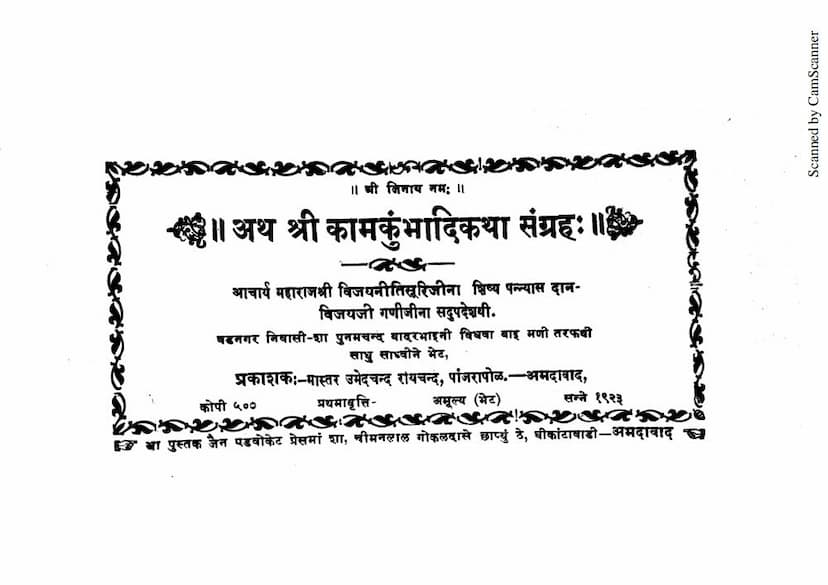Kamkumbhadi Katha Sangraha
Added to library: September 2, 2025

Summary
This document is a summary of the "Kamkumbhadi Katha Sangraha" by Umechand Raichand Master. The book, published in 1923, is presented as a gift and aims to explain the principles of Jainism through various stories.
The text begins by emphasizing the importance of human life and the Dharma, comparing it to obtaining a wish-fulfilling gem. It highlights Dharma as the source of all auspiciousness, happiness, and fame, and describes it as a wish-granting cow, a Kalpa tree, and a bestower of all fruits. The scripture asserts that Dharma protects one from dangers, misfortunes, and suffering in this world and leads to heavenly realms and liberation.
The core of the document is the story of Matisagar, a wise minister to King Jitarish of Shripur city. King Jitarish believes that all happiness comes from sin, while Matisagar advocates for the power of Dharma. This leads to a debate between them, with the King challenging Matisagar to go to a foreign land and earn wealth, proving the efficacy of Dharma.
Matisagar embarks on his journey and encounters a Rakshasa (demon) who spares him after Matisagar promises to fulfill its desire later. He then visits a temple of Lord Rishabhdev, where he sings praises. A Yaksha appears, pleased with his devotion, and grants him a "Kamkumbha" (wish-fulfilling pot).
On his return journey, Matisagar encounters the Rakshasa again. To satisfy its hunger, Matisagar uses the Kamkumbha to produce a delicious meal. The Rakshasa, impressed, asks for the Kamkumbha. Matisagar initially hesitates but eventually gives it to the Rakshasa, who in turn gives him a divine staff.
The Kamkumbha proves invaluable to Matisagar. He uses it to provide food for a group of Jain travelers (Sangh) and to create a luxurious feast for the King and his entourage, demonstrating the power of Dharma. The King, witnessing these miracles, is initially impressed but remains skeptical, believing it to be luck rather than divine power. He challenges Matisagar to prove the power of Dharma again by going to a foreign land with his wife and earning wealth.
Matisagar undertakes this challenge and travels to a new city. There, he uses his intelligence and skills to become a successful merchant. His wife, Vinaysundari, demonstrates exemplary chastity and adherence to Jain principles while he is away. Matisagar's wisdom is further tested when he deciphers ancient copper plates, revealing a hidden treasure, which earns him further respect and a share of the kingdom from the King.
Despite these displays of Dharma's power, the King's son, Sagaradatta, falls prey to greed and lust. He plots against Matisagar, eventually throwing him into the sea. However, through his past good deeds and devotion, Matisagar survives and is aided by divine intervention. He encounters a princess who was cursed by a Rakshasi and, with the help of his knowledge and the Kamkumbha's remnants, liberates her and defeats the Rakshasi.
Matisagar, with his rescued wives and newfound allies, returns to his homeland. He proves his worth to the King and his people, demonstrating that true prosperity and well-being stem from Dharma. The story concludes with Matisagar and the King of his adopted land ruling justly, and both are later shown to attain salvation after embracing Jainism. The text emphasizes that true strength lies in virtue, knowledge, and adherence to Dharma, which ultimately lead to happiness and liberation.